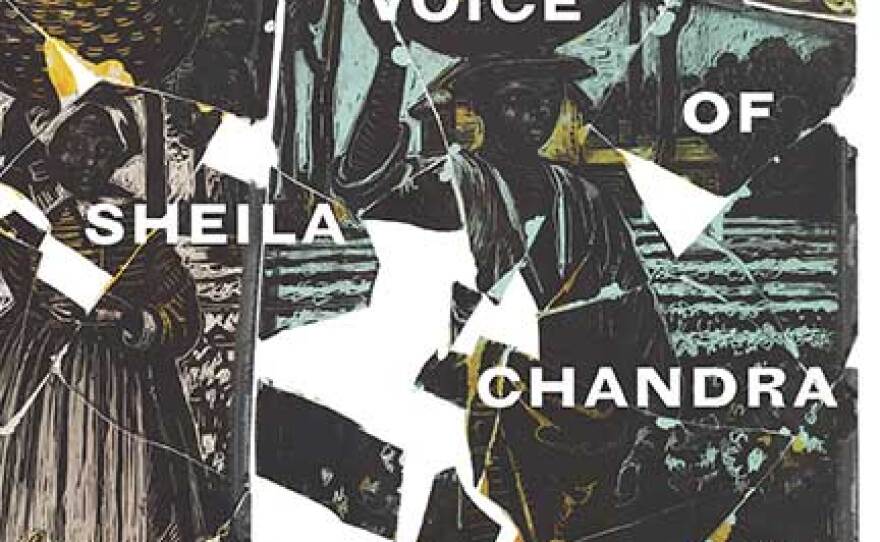Kazim Ali's new book of poetry, "The Voice of Sheila Chandra," is in some ways a historical account, part lyrical and evocative contemporary poetry, part mystical and metaphysical invocation, and part interwoven puzzle of language. And it started with a broken voice.

Chandra is a popular Indian singer who lost her ability to sing or speak.
"A lot of her body of work is drones and a certain type of Indian vocalization called 'konnakol,' where the singer imitates a drum or imitates percussive sounds. And I just became really interested in all of the different qualities of a voice and all of the different sounds a human voice can make," Ali, who teaches creative writing at UC San Diego, said
Chandra developed a rare neurological disorder known as burning mouth syndrome in 2008, which rendered her unable to sing or even speak without feeling physical pain.
"And so I also became interested in the concept of silence, and the qualities of silence and sound and what of sound lives in silence and what of silence lives in sound," Ali said. "And so the poems themselves try to explore that from many directions."
The book, Ali's seventh poetry collection and 20th published book, consists of three longer poems stitched together with several fragments or interstitial works. Ali said he wanted the longer works to build a "glacial architecture," into the structure to support and slow down, and set a stage for the smaller works to add drama.
Carried cacophony world wheel
Into the human one small voice
Box pool swum midnight we went
Into the sea expecting our prayers
Might carry themselves across
The silver-slammed surface would
Be answered or do they answer
Pale cut of prayers do not answer
Like back into the dark water what
Are those stripes of light across
The room a shape that evaporates
Upon waking what language cannot
Hold onto what you cannot
Hold onto
— from the poem "The Voice of Sheila Chandra" by Kazim Ali
"Phosphorous" is a longer, lyrical piece that becomes a kind of puzzle of language, grids of capital letters that break apart the poem and make us slow down to track each letter, like math. But those grids end up being almost like tiny choruses or meditations — striking and lovely, offset from the longer, song-like lines.
"It's important to me to really try to explore all different dimensions of a speaking voice in a poem as well, just like the singing voice can be explored in so many different directions," Ali said. "When you have a singer like Sheila Chandra, or Tanya Tagaq, the Canadian throat singer or Lila Downs or Bjork or Yoko Ono, singers who really explore the range of what a voice can do, who move through ranges, it's quite unusual."
B R I G
H T B Y
T H E B
E D S I
D E O F
L A S T
L I N G
E R I N
G S O M
E O N E
— from the poem "Phosphorous" by Kazim Ali
The timelines and physical spaces of these woven narratives are scattered and broad, and Ali uses these characters to show the interconnectedness — and, in contrast, the metaphysicality — of human bodies and their stories.
In either case we are inventing the past which means it changes the future which means the machine of time is real made of gears and parts
Register each body like tickets for the train.
— from the poem "Hesperine for David Berger" by Kazim Ali
Ali said that as he wrote this poem, he wanted to see how to face a violent past.
"The poem itself became this active gesture towards trying to create some magic. I thought, there has to be a way to not erase history, but recreate it in some way that will allow us to live," he said.
The collection is as mechanically complex and intentional as it is propulsive, driven by fascinating figures, snippets of scenes and enchanting ideas of the sheer immeasurability of time. And the book's release in 2020 is, well ... timely.
"We're in a freefall, but we're also riveted in place," Ali said. "It's a very tense time, yet it's also a time of stillness."
He notes that a flashpoint, a turning point for the chaos was George Floyd's death, and points to how people want to understand any big historical events.
"We often think about history turning on a weird dime, of some kind of breaking point that has nothing to do with what came before, what came after it — the idea of the historical event," Ali said. "But really, it isn't like that. It is more like the concept of kismet where there's a never-ending chain of happenings that grow and develop and change and then at some point, yeah, the seed breaks ground and comes out into the world."
"The Voice of Sheila Chandra" is out now, and Kazim Ali will appear in several virtual readings in the coming weeks.







